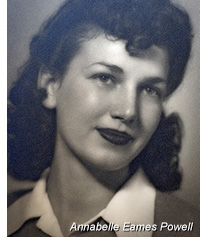Introducing the Annabelle Eames Powell Memorial Challenge!

Diane Frendak American Astronomical Society (AAS)
The AAS has launched its Spring 2015 Campaign to raise funds for Society prizes, programs, and activities. At the heart of this effort is something entirely new: the Annabelle Eames Powell Memorial Challenge Grant in Support of the Annie Jump Cannon Award in Astronomy.
The Cannon Award celebrates outstanding research and the promise for future exceptional work by postdoctoral woman researchers. In a generous show of support for the distinguished contributions to the advancement of astronomy made by women, AAS member J. W. Powell of Reed College’s Physics Department has pledged to match, dollar for dollar up to an agreed-upon cap, all donations received for the Cannon Award Fund through 15 August 2015. Powell’s inspiration for the challenge grant is the memory of his late mother, Annabelle Eames Powell, a staunch advocate for women in science, who died 19 October 2014 at age 90."Annabelle (who very much liked the nickname Annie) never knew of Annie Jump Cannon,” writes Powell, “but she would have admired her — a woman on the forefront of scientific research, contributing to the understanding of astronomical phenomena.”
The Annabelle Eames Powell Memorial Challenge Grant makes your donation twice as effective. Donations may be made online or mailed to the Executive Office of the American Astronomical Society at the following address:
Annie Jump Cannon Award in Astronomy
American Astronomical Society
2000 Florida Ave., NW, Suite 300
Washington, DC 20009-1231, USA
Your response to this appeal will help ensure that the AAS continues to recognize deserving astronomers like the 2015 Annie Jump Cannon Award winner, Smadar Naoz (University of California, Los Angeles). She was singled out for her pathbreaking contributions in cosmology and planetary dynamics. In a landmark paper published in Nature, Naoz showed that the presence of a massive planet in an orbit that is distant, slightly elongated, and moderately inclined relative to its host star's equator can naturally explain observations of "hot Jupiters" in orbits that are much closer to the star, highly elongated, steeply inclined, and even retrograde relative to the star's rotation.
Help us make the most of this unique opportunity by contributing to the Annie Jump Cannon Award Fund this spring!



